Our weekly message: Friday 09 January 2026
Posted on 09 January 2026 by Mr Roundtree
It’s a little late, but we wish everyone a happy new year.
New year, new details? If there are any new contact details for you or other contacts, please remember to let us know. We need up-to-date details for the people on our lists in case of emergencies. (The people on our lists are the ones you gave us when your child school – in most cases, this will be three different people.)
Attendance
Our attendance so far this year is 94.0% – this is a lower than the national figure for primary schools (95.1%) and lower than our attendance rate for Autumn 2024 (95.4%). Let’s hope it can rise across the Spring term.
Please continue to check the NHS site, Is My Child Too Ill For School.
Positive home-school relationships
Have you read our Positive Home-School Relationships Policy? It sets out reasonable expectations for meetings or emails with teachers and – occasionally – what we might do if we encounter unreasonable communications or unacceptable behaviour.
Staying safe online
Here’s an extract from an email from, Dame Rachel de Souza, the Children’s Commissioner:
I have recently published a new guide, What I wish my parents or carers knew: A guide for parents on managing children’s digital lives.
Supporting children’s safety is a shared responsibility between families, schools and wider society. For parents and carers, this responsibility has become increasingly complex as children’s lives are now deeply intertwined with the digital world. Many parents face difficult decisions about how to balance protecting children from online harm with enabling access to spaces that are now central to learning, socialising and play.
This guide…focuses on the challenge of managing children’s everyday online habits.
This guide was written with the direct involvement of children in England. It is a reflection of their views.
When I speak to children about what they would do differently when it comes to being online, with the benefit of hindsight, I ask them: would they give a smartphone to their own teenager? Almost unanimously, they tell me no. They want to be protected from it as long as possible.
As parents, carers, and educators, our job must begin and end with our children’s care and safety. It’s what they expect and what they want from you.
As one young person told me: “Don’t be afraid to be firm… If you are worried [that] your child is seeing harmful content and you don’t know what they’re watching and it’s affecting the behaviour, just take it that you know best – they don’t.
School dinners
In January 2025, 7,724 pupils entitled to a free school meal missed out on a free, hot lunch. School meals can be cheaper than a packed lunch. Think of the time you could save, too! All of our school meals are cooked on site and freshly prepared. Find out if you’re entitled to free school meals by applying online.
Our second Watch Us While We Work session for parents of children in Key Stages 1 and 2 is next Wednesday at 9.00am. As always, there will be two parts. One will focus on a feature of our Living and Learning curriculum that we call Feelings First, and one will focus on Reading. See you then!
Our Christian value focus this half-term is...
Posted on 07 January 2026 by Mr Roundtree
…honesty.
At St James’ CE Primary School, we learn about Christian values that help us to become well-rounded citizens in society. Each half-term, we have a new Christian value that will be embedded into our collective worship and our reflection areas.
What is honesty? Honesty is being trustworthy and truthful in our friendships, our relationships, our school and our community. We understand that we need to be honest and truthful with others when working together as a team. There are challenges for us:
- How can we be honest in our daily lives?
- How can we encourage people to be honest?
- What can we do to fix it if we forget to be honest?
‘Let us not love with words or speech but with actions and in truth.’ (1 John 13:18)
In the Bible, we hear about Zacchaeus (Luke 19:1-10), the tax collector, who was dishonest and stole money from others. Jesus went to visit him and he realised he had made a mistake. He saw the error of his ways. He had a total change of heart and got rid of his dishonest ways to follow Jesus.
Help at home!
Talk with your family about the consequences of not being honest or write a story or draw a picture to show what happens when people are dishonest. Bring it in to add to your class reflection areas.
Our weekly message: the last in 2025
Posted on 19 December 2025 by Mr Roundtree
Thank you for all your support this term. This week’s message has a mix of articles…
Christmas productions
Thanks to everyone who came to one of our Christmas productions this week – we hope you enjoyed Humph!
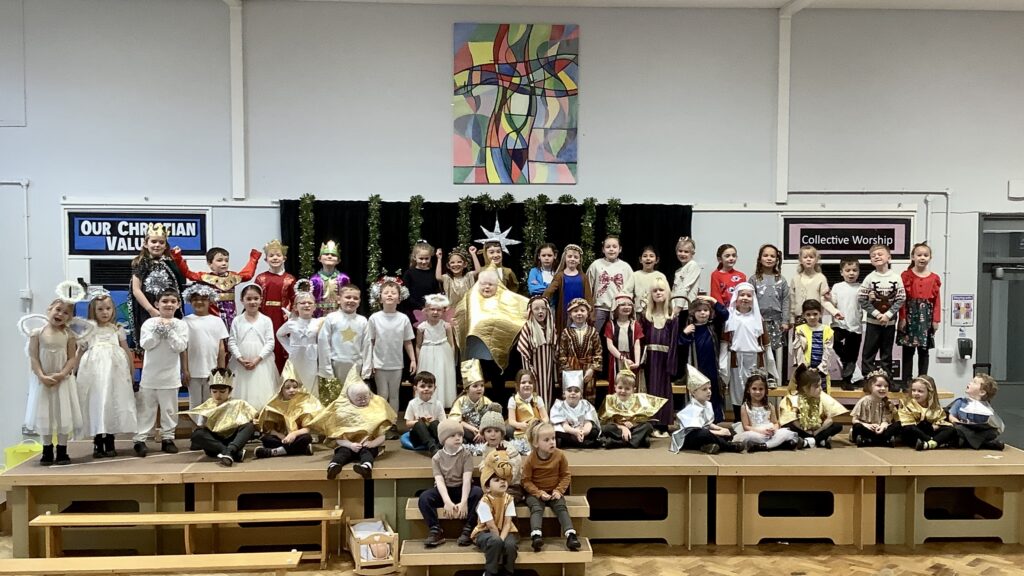
The production raised £182.16 for our current school charity, Martin House Children’s Hospice. Thank you for all donations.
Move to Arbor
Our management information system move to Arbor is well underway. Thank you to the 81% of parents/carers who have logged into the parent portal. You should have noticed that most of the communications now come through Arbor. If you have not seen any emails for a while, please check your spam box and make sure you mark emails from school as safe.
From January, all payments should be made on Arbor. Reception, Year 1,2 and Year 3,4 all have trips coming up next term. Emails have been sent out about these, and payment can be made on Arbor.
Also, just a reminder to download the Arbor app and set up your phone so you receive notifications. Quick/short messages will be sent in-app rather than by text message (as in-app messages are free for us to send).
Get out and about over the holiday…
Over the holiday, it can sometimes be good to get out and about. There’s lots going in Leeds – check out the Child Friendly Leeds Winter Guide.
…and stay safe online
2 in 5 parents more relaxed about children’s online safety over Christmas according to this article. This might be at a time when children are even more online than normal. Check out this guide: the 12 Days of Online Safety.
Have a very happy Christmas and we’ll see you again in the new year – Monday 05 January 2026.
Our weekly message: Friday 12 December 2025
Posted on 12 December 2025 by Mr Roundtree
It’s a busy time of year, but it was lovely to see so many of you at the Christingle service on Wednesday.
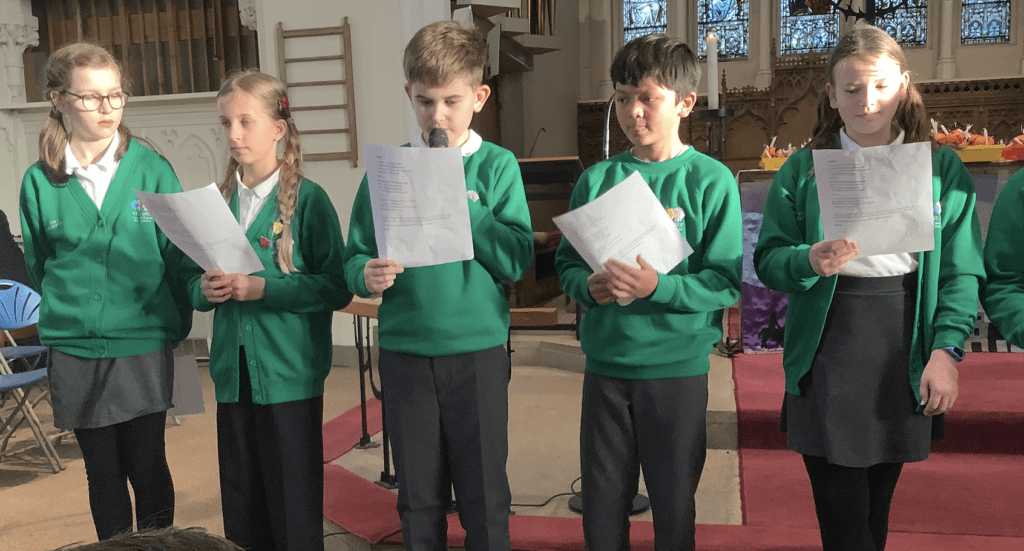
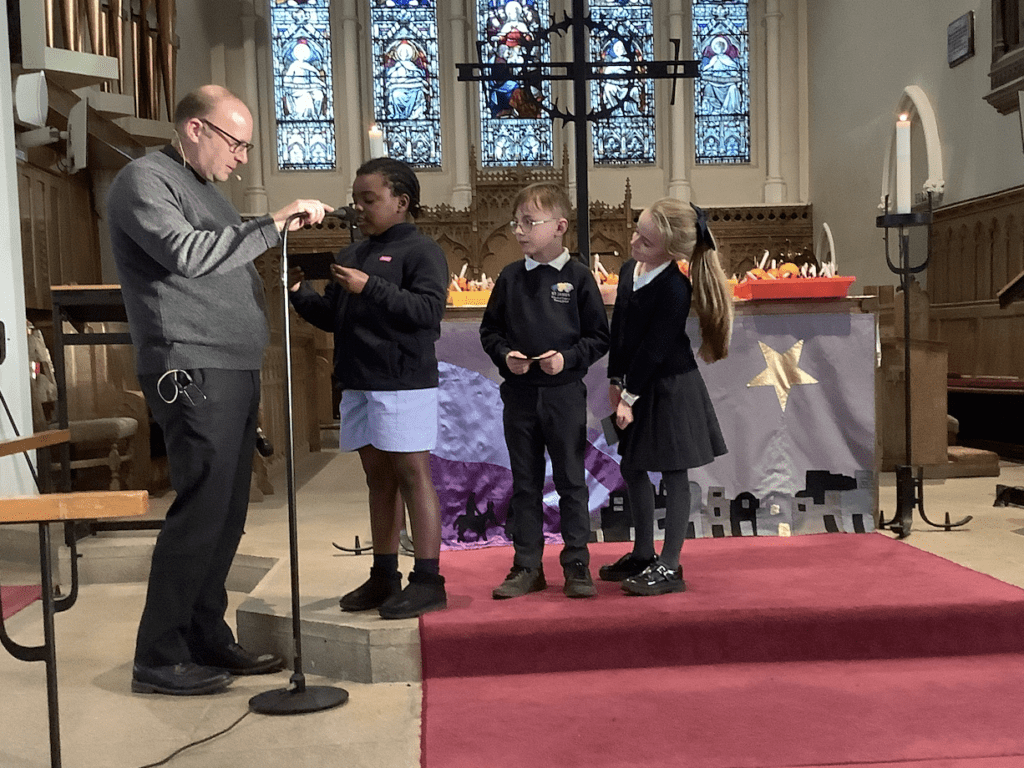
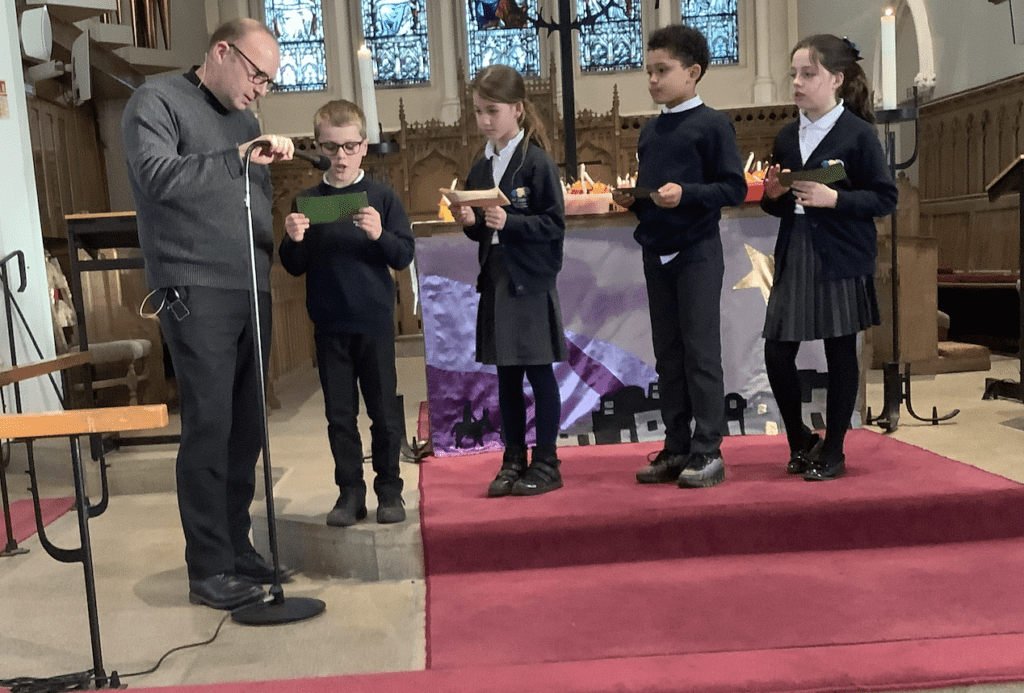
Living and Learning
This week’s Living and Learning theme has been about giving and receiving compliments.
Spend a week giving compliments to each other at home each day. Try to make sure the compliments are about what we’ve done and not just how we look – we’ve got more power to change what we do than how we look so these compliments can be much more effective.
Some children find it hard to receive compliments, so this week of giving compliments might help, too.
How we communicate with you
After-school club – early closing
Next Friday is the last day of term. If you use our wrapround care on Fridays, please remember it closes early: 5pm.
Finally this week, thank you to the pupils who have visited Warm Spaces this year, and thank you for the warm welcome when we got there!
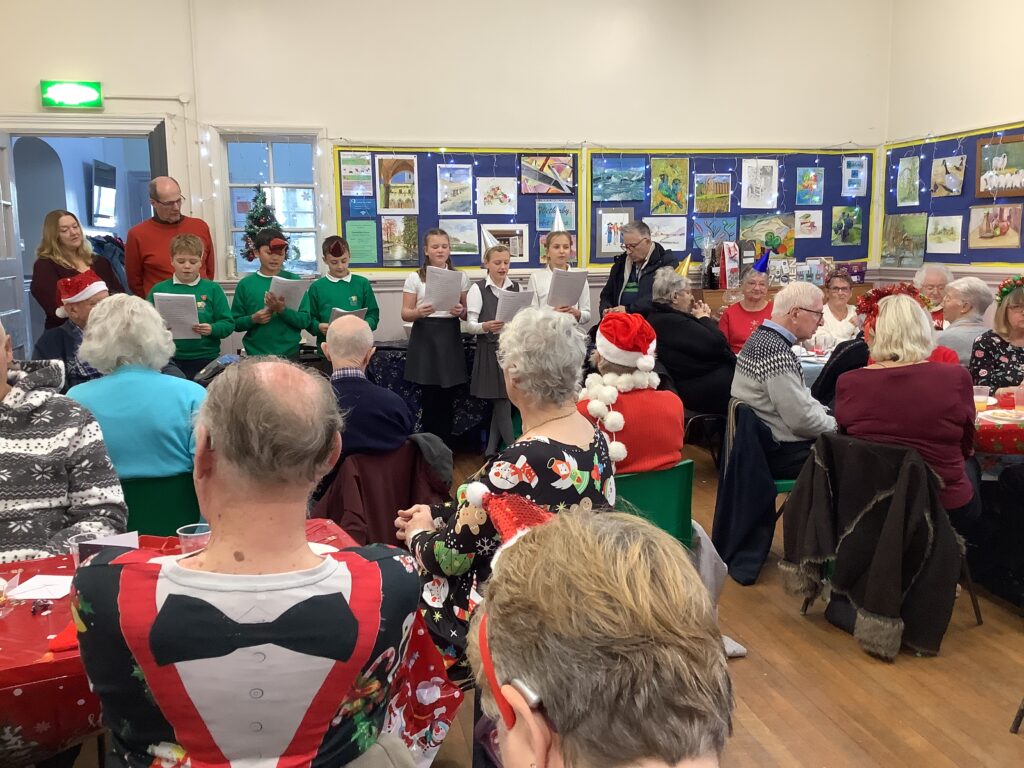
Have a happy and healthy weekend.
Our weekly message: Friday 05 December 2025
Posted on 05 December 2025 by Mr Roundtree
At this time of year, there’s a recurring theme to school: the sound of younger children rehearsing for their Christmas production! The build up to Christmas is an exciting time, but it can mean children are tired – sticking to routines and getting plenty of sleep is needed to help everyone.
Rocksteady
On Wednesday, we welcomed parents in to watch our end of term Rocksteady concert. There were six bands on show with a range of children across both key stages showing off their talents. It was so lovely to see children achieving and believing in themselves – the courage shown by all to perform to a full crowd really shone through. All our band members have thoroughly enjoyed Rocksteady (and based on the huge applause, I think parents have, too!).
Here’s just one of the songs performed. (We can’t post the videos of all songs due to video sizes and photo permissions – sorry.)
Look out for more about Rocksteady at St James’ CE Primary before the end of term.
Topic review
Did you come to our Topic Review session last Friday? If so, thank you!
And did you manage to find a couple of minutes to leave us some feedback? Again, if so, thank you.
- ‘It was good to see how much fun my son and friends have whilst learning.’
- ‘Very informative and all children seemed interested in the topic.’
- ‘All the kids seemed really engaged and knowledgeable.’
- ‘It was good to see how engaging the teacher was with the class and what the children are learning for their topic.’
- ‘Great to see the teaching in the classroom. Great pupil engagement and interesting topic.’
- ‘Brilliant lesson. Super interesting and very engaging’
- ‘It was great to be able to see both of my children. I liked that the sessions were interactive and my children were able to talk to me about what they’ve been learning as well as showing me their work.’
Thanks to the parents who got stuck in, too – here are some pics from the Year 6 Topic Review session…
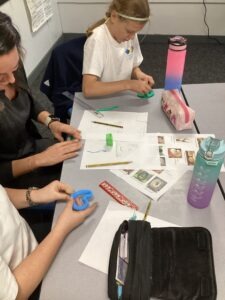
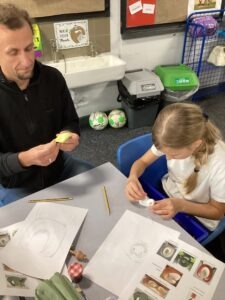
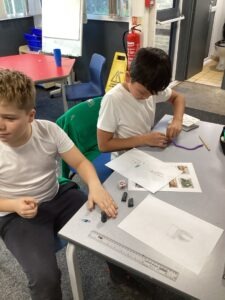
Best start in life
The Best Start in Life website brings together trusted advice, support and guidance for parents of younger children.
Check out ‘The Story of You’, which celebrates the journey of early childhood, highlighting the vital role they play in their child’s lives and the support available.
Subscribe to the newsletter or personalised weekly emails for tailored
updates, tips, and guidance.
Chat Health (for older children and young people)
The Chat Health service is for people aged 11 to 19.
It offers support on a range of issues such as exam anxiety, self-harming, family dynamics such as parental separation, bullying, healthy eating and general health.
This is a universal service provided by Leeds Community Healthcare NHS trust. It’s available Monday to Friday between 8.30am and 4.30pm, excluding
bank holidays.
Our weekly message: Friday 28 November 2025
Posted on 28 November 2025 by Mr Roundtree
If you came along to our Topic Review session this afternoon, thank you. We hope you enjoyed the session. If you’d like to leave some feedback, we’d love to read it. We pass compliments on to teachers and take on board suggestions.
Today’s the last day of our 100% in November attendance competition…
In total, 91 had 100% attendance. In assembly this afternoon, winners from each phase were randomly selected:
- Early Years: Leo (Reception)
- Years 1 and 2: Evelyn (Year 1)
- Years 3 and 4: Alfie (Year 3)
- Years 5 and 6: Madeleine (Year 6)
Each of the four winners win a £25 Love2Shop vouchers. Well done to all the children with 100%.
The next part of this week’s message is from our PTA. Let’s start with festive news: PTA will be selling tickets to the Christmas Disco all next week.
Your School Lottery
Your School Lottery is great! A member and supporter of our community wins a cash prize every single week and each month there’s a fantastic prize on offer – from a £500 Lego voucher to a Nintendo Switch Bundle, the prizes are brilliant. There’s also a £25,000 jackpot up for grabs each week (one of us will win it one day, we feel sure of it!).
The more tickets we sell the more money goes to our school. Get your ticket!
Look out for monthly communications to tell you about the current monthly prize. Good luck!
Easyfundraising
Easyfundraising means your online shopping can help to raise free money for school. It’s completely free for parents. If enough people use it, we’ll make some completely free money for school.
Over 7,000 brands will donate to us when you use easyfundraising to shop with them – at no extra cost to yourself! All you need to do is sign up and remember to use easyfundraising whenever you shop online. Did we mention it’s easy and completely free?!
These donations really mount up, so please sign up to support us!
Pre-loved uniform
We all know how quickly kids grow out of their uniform, so our dedicated Uniform Fairies collect donations and then twirl their magic wands to make the items ready for their next owner. Ta dahh!
This is a service aimed at helping people, rather than making money, so items are not priced. Instead it’s a pay-as-you-feel system (minimum £1). If you need any items at any point in the year, please email us on the email address below or speak to one of us in the playground.
This information comes from our PTA page on the website.
Finally this week, a competition from Active Leeds…
We’re inviting children and young people across Leeds to get creative and celebrate their local leisure centres! 
At Active Leeds, we believe our leisure centres are more than just places to swim or work out… they’re spaces where memories are made, friendships grow, and confidence builds. From learning to swim to trying gymnastics for the first time, or simply spending time with friends, there are so many amazing experiences that happen every day in our centres.
We’re asking young people to share an experience they’ve had at their local leisure centre through art, writing, animation, or any creative way they like. It could be a drawing of their swimming lesson, a collage of their favourite activity, or even a short animation showing what makes their centre special.
The winning creation will receive a £50 Amazon gift voucher and be featured in our upcoming MADE IN LEEDS campaign, seen right across the city!
We want to highlight the joy, energy and sense of community that our centres bring to young people and their families. Who better to show that than the kids themselves?
Entries are open until 01 December 2025.
Simply send a photo or video of your entry to sport.webupdates@leeds.gov.uk.
Our weekly message: Friday 21 November 2025
Posted on 21 November 2025 by Mr Roundtree
Last week was Children in Need day. Our non-uniform day raised £62.80 (lower than normal perhaps because of the class trip happening on the same day) – thank you to all who contributed.
Attendance matters
- The national attendance rate for primary schools is 95.4% (that’s for Autumn 1 term).
- Our attendance rate is 94.5% (that’s up until 18 November).
Our attendance is lower than the national average. It’s also lower than it was at St James’ CE Primary last Autumn term.
Is my child too ill to attend school? It can be tricky deciding whether or not to keep your child off school. Check the NHS website: Is my child too ill for school?
Thinking of a term-time holiday? 468 penalty notices for unauthorised absences have been issued in Leeds so far this year. Check out the legal consequences of term-time absences, from fines to court action.
Remember 100% in November!
We’ve one more week left of our attendance competition. Children with 100% attendance in November have the chance of winning one of four £25 Love2Shop vouchers – one for every phase in school. If your child attends every school day on time from 03 November to 28 November, their name will be added to the prize draw. We’ll select four lucky winners next Friday.
Applying for a Reception place?
The national closing date for Reception September 2026 applications is 15 January 2026.
Check out these frequently asked questions.
MindMate
On Wednesday, the MindMate Support Team held a workshop about supporting your child with anxiety.
There are three more support sessions coming up this year:
-
Support your child’s mental wellbeing – Wednesday 11 February, 5pm to 6pm at Deighton Gates Primary School, Deighton Rd, Wetherby, LS22 7XL
-
Support your child’s emotions – Wednesday 11 March, 5pm to 6pm at Bramham Primary School, Clifford Road, Bramham, LS23 6JQ
-
Support your child with transition – Wednesday 24 June, 5pm to 6pm at our Sphere Federation sister school, St James’ CE Primary School, Hallfield Lane, Wetherby, LS22 6JS
Read more about the workshops.
Have a happy and healthy weekend.
Our weekly message: Friday 14 November 2025
Posted on 14 November 2025 by Mr Roundtree
We’ll start this week with news about a workshop aimed at offering help to parents to support their child with anxiety…
The workshop is from MindMate Support Team and will cover:
- what anxiety is and how it affects young people
- how anxiety can appear in everyday behaviour
- common triggers and their impact
- practical evidence-based strategies to manage anxiety
- building confidence in supporting your child
The workshop is on Wednesday 19 November 2025, 5:00pm – 6:00pm. It’s at St. Joseph’s Catholic Primary School, Barleyfields Road, Wetherby, LS22 6PR.
The rest of this week’s message is about the Autumn 2 topic in Key Stages 1 and 2. Last half-term, it was a Geography topic; this half-term, it’s Art…
This half-term, we’re artists. We’ll be developing our art knowledge and skills. The learning has two aspects to it. In art history and appreciation lessons, children will be learning about some specific artists and their work. In art process lessons, children will practise and develop skills by creating art.
Each phase has age-related specific knowledge, skills and vocabulary that they’ll learn, use and apply across the topic. Follow this link to the Curriculum Guide to find out more.
Years 1 and 2
Children have two featured artists who they’ll be studying across the half-term: Leonardo Da Vinci and Paul Klee. They’ll compare their art, talking about similarities and differences. They’ll discuss what they like and dislike about the art and how it makes them feel. They’ll also learn about the artists’ lives and where in the world they lived.
In practical art lessons, children will be honing their artistic skills and knowledge by sketching objects using pencil, learning about and mixing colour and then they’ll be learning how to print by creating relief prints inspired by the artwork they’ve studied.
Part way through the half-term, they’ll visit the Hepworth Gallery for a printmaking workshop to complement the learning in school.
Years 3 and 4
Children will be learning about the work of Wassily Kandinsky and Martha McDonald Napaltjarri. They’ll compare and contrast the artworks by these artists and also learn about their lives and the places they lived. In particular, children will learn about abstract and figurative art (see the vocabulary for definitions of these words).
In practical art sessions, children will develop observational drawing skills and their understanding of colour by learning about warm, cold and complementary colours. They’ll then apply what they’ve learnt by creating sculptures inspired by the artists they’ve studied.
Years 5 and 6
Children are learning about sculpture in their art lessons and will be focussing on three artists: Thomas J Price, Henry Moore and Barbara Hepworth. The children have already been on their school trip to the Yorkshire Sculpture Park where they’ve seen and learned about sculptures by these artists. In Art history and appreciation lessons, they’ll learn about the lives of these artists and how their localities have influenced their art. They’ll learn about classical and modern art in relation to their featured artists and in art movements more generally. They’ll also learn when and why the modern art movement happened.
In practical Art lessons, children will develop their observational skills and will create ‘soap sculptures’ inspired by the work of Henry Moore and Barbara Hepworth.
How can you help?
Talk to your child about what they’ve been learning in class. The Class News page of the school website is a good place to find out more about what the children are doing.
Familiarise yourself with the artists and the artwork that your child will be learning about in class. Look in books or on the internet for pieces by the artists and talk about them. Find art by other artists that you like and compare it to the featured artists. If you feel confident, you can go into more depth using the vocabulary. However, if not, leave that to the teachers and just enjoy looking at the pieces and asking general questions:
- What do you like or dislike about the art?
- How does the art make you feel?
- Is it life-like or not?
- What colours can you see?
The Tate Gallery has a good children’s website with games and activities which children can explore.
If you’re in Leeds, the Leeds Art Gallery and Henry Moore Institute are both free to enter.
Finally, have you met our new Administrator, Claire Furlong, yet? Check out our Who’s Who page to find out a little more about Claire!
Chosen charity
Posted on 10 November 2025 by Miss Beatson
Last week, the children voted for the charity we will be supporting as a school this year. The overall decision was made by the Junior Leadership Team. This year we will be supporting Martin House.
Our weekly message: Friday 07 November 2025
Posted on 07 November 2025 by Mr Roundtree
We hope you had a good half-term break. This week in school has been a themed week – Me and My Money. Talk to your child about something new they’ve learnt or considered about money!
Remember 100% in November
We’re at the end of Week One of our attendance competition…
Throughout November, children with 100% attendance have the chance of winning one of four £25 Love2Shop vouchers. There are four vouchers to be won – one for every phase in school:
- Early Years (Nursery and Reception)
- Key Stage 1 (Years 1 and 2)
- lower Key Stage 2 (Years 3 and 4)
- upper Key Stage 2 (Years 5 and 6)
So… if your child attends every school day on time from 03 November to 28 November, their name will be added to the prize draw.
We’ll select four lucky winners on Friday 28 November.
Odd socks day
Monday is Odd Socks Day.
The day celebrates that we’re all unique. Children are invited to wear odd socks to school today, marking the fact we’re all different in some way. Part of Anti-Bullying Week, the day sends an important message to pupils that they should be allowed to be themselves, free from bullying. It helps us celebrate anti-bullying day in a fun and positive way.
Help at home: Please make sure your child knows that bullying is wrong and damages children’s social and/or emotional health. Check they know our two STOP messages:
- Definition: What is bullying? Hurting someone Several Times On Purpose
- Solution: How can we stop bullying? Start Telling Other People
Bullying is often group behaviour. For older children, it would also be great if you could talk about the different roles people might play. Watch this short clip together, and link it back to Start Telling Other People.
Children in Need
Next Friday is the annual Children in Need fundraising day. Your child is invited to attend school in non-uniform with a donation to the charity. If you wish to donate at school, please donate in cash only.
Please remember that pupils should dress appropriately and respectfully, even on non-uniform days. More details can be found in our Uniform Policy.
Is my child too ill for school?
As winter approaches, schools face rising illness-related absences. We know some are unavoidable, but please refer to NHS guidance to know if your child is too ill for school.
The Department for Education has asked us to share some key messages:
- Always ask: Is my child too ill for school? Use the NHS site for guidance – it’s easy to use.
- Pupils shouldn’t miss school on a precautionary basis and can normally attend with a mild cough or cold, unless they have a fever or diarrhoea or vomiting.
- Book medical appointments outside of school hours where possible. Where this isn’t possible, they should bring their child to school before, and return after, if they are well enough. Pupils can attend appointments in their school uniform.
Times tables
The government sets out the expectation that children should know their times tables by the end of Year 4. Knowing times tables off by heart makes a huge difference to children’s progress in Maths. It helps them:
- solve harder problems more easily
- work more confidently and quickly
- focus on new concepts without getting stuck on basic facts
Times tables underpin many other areas of Maths, such as division, fractions, long multiplication, algebra and ratio. The more fluent your child is, the better prepared they’ll be for future learning.
At St James’ CE Primary, children in Years 3 and 4 take part in daily Mastering Number lessons to learn their times tables. Older children continue to practise their times tables.
In school, we chant multiplication facts by saying the smallest number first and we don’t say ‘times’ or ‘equals’. For example, for 4×3=12, children would say ‘3, 4, 12’.
Towards the end of Year 4, children do an online Multiplication Tables Check – find out more about this.
We’re proud that almost half of Year 4 pupils in 2025 achieved 25 out of 25 in the check – much higher than national figures. Thank you for continuing to help your child practise their times tables at home.
Finally this week…
Admissions consultation
Leeds City Council is running a public consultation on the 2027/28 admission policy for Leeds community and voluntary controlled schools. You can share your views until 1 December. Find out more.
Have a happy and healthy weekend.

